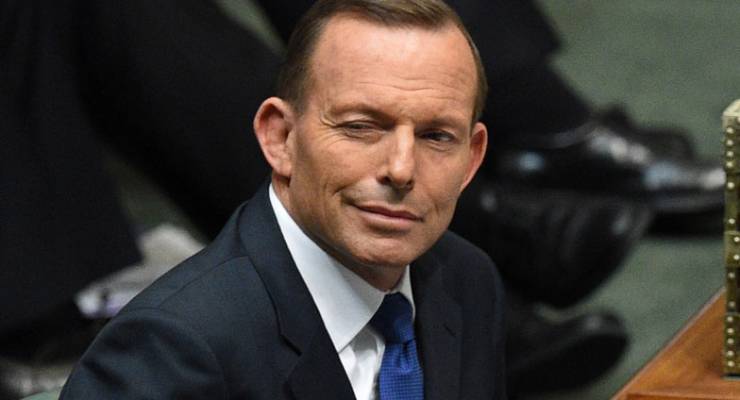
You might be left with an impression from the mainstream media coverage of Sam Dastyari’s enthusiasm for Chinese money that in politics both sides are equally guilty of trying to get away with as much as possible on donations. In fact, this is one issue where the standard “plague on both their houses” doesn’t apply.
For the last decade, the Coalition has done everything possible to reduce transparency about political donations and thwarted attempts to increase it. But the Greens have consistently advocated reform and Labor has made two substantial efforts to increase transparency, as well as voluntarily providing for greater insight into its financial affairs than its opponents. The result is that, with Coalition voices now emerging in support of political donation reform, there’s bucket loads of hypocrisy to go round. For example:
Tony Abbott
Now says he supports banning union, company and foreign donations. His track record: member of Howard cabinet that dramatically curtailed donations transparency in 2006, member of shadow cabinet that blocked Labor’s bill to ban foreign donations in 2009, agreed with the Gillard government on a poorer-quality reform bill that still would have banned foreign donations, then reneged on it, did nothing about donations while prime minister. Accepted a Rolex watch from a Chinese tycoon and the NSW Liberals filed a donation from his fundraising body four years late.
Eric Abetz
Now says he’s a long-term supporter of banning foreign donations. Complains he was ignored on donations reform when he was special minister of state under Howard. He was deputy leader of the opposition in the Senate when the Senate blocked Labor’s bill to ban foreign donations in 2009; was paired in the final vote, and did not contribute to the debate.
Cory Bernardi
Now wants to ban foreign donations. Voted against Labor’s bill to ban foreign donations in 2009. Runs a political foundation that does not disclose its finances.
John Howard
Opposes wide-scale reform but says “I think transparency is the key” and that there should be more rapid reporting of donations. Behold the rolled-gold standard in donations hypocrisy, from the “Non-Core Promises” Australian master of political casuistry: it was Howard’s 2006 political donations changes that dramatically reduced transparency by lifting the reporting threshold from $1000 to $10,000 — an indexed figure that is now over $13,000. Transparency was certainly key for Howard — a key target to be attacked in the biggest assault on political transparency in decades.
But even the most committed enemy of political donations transparency of recent generations admits that the current disclosure process, by which we can be made to wait more than 18 months to find out who donated to a party is “far too long”.
And in fact there’s nothing to stop parties from voluntarily providing donation disclosure in virtual real-time now. Howard’s 2006 changes lifted the disclosure threshold from $1000 to $10,000 but starting in 2008, federal Labor began voluntarily reporting donations above $1000 and has done so ever since. While an actual real-time system of reporting might require a small amount of IT investment, a web page for each party branch, listing donations and other funding (remembering the shift from donations to subscriptions that the major parties are currently pursuing), updated once a week would require next to no additional operational resourcing.
Parties could even follow the lead of Clive Palmer and declare every cent of donations, no matter how small, rather than only disclosing above $1000 — even though the real concern about disclosure relates to massive donations rather than contributions in the hundreds of dollars.
There’s also nothing to stop a party voluntarily refusing foreign donations, but that would have major ramifications for its funding compared to its opponent. Unlike donations from tobacco companies, which Labor stopped accepting when Mark Latham was leader — the Liberals didn’t follow suit until 2013 — foreign donations total millions of dollars for both sides, and renouncing them would have the other side at a massive financial advantage.
But near-real time donations disclosure has no disadvantage and no significant costs. And even John Howard thinks the parties should be doing better. It’s the closest you’ll get to a no-brainer in donations reform, and you don’t need legislation overseen by a party that is implacably opposed to transparency.








For Abbott there is also the unadvertised, unpublicised scholarship worth $60,000 that was seemingly available only to his daughter.
And his persecution of the whistle blower. Lovely fella.
I wonder how much miners (remembering how they reacted to the Mining Tax) have paid for this Limited News Party government – making it a “miner party”? …. Besides Gina taking Jethro, Lady Penelope and Gambaro out (of the country) for an Indian take-away?
There is a good analogy with the heroin trade here – the desperation of the recipients means they’ll do anything for the donor.
The solution might be to remove the cause of the greed – the huge amounts of money spent on advertising (tax deductible so a double insult and assault on decency) which then means huge amounts to the meeja to publish the damned advertising in all meeja platforms.
The UK doesn’t even allow such excrescences on the airwaves.
Excellent piece but for the omission of Turnbull himself whose donation of $2 million of his own money to Liberal campaign funds this year may have bought him his mandate but which he neither confirms nor denies.